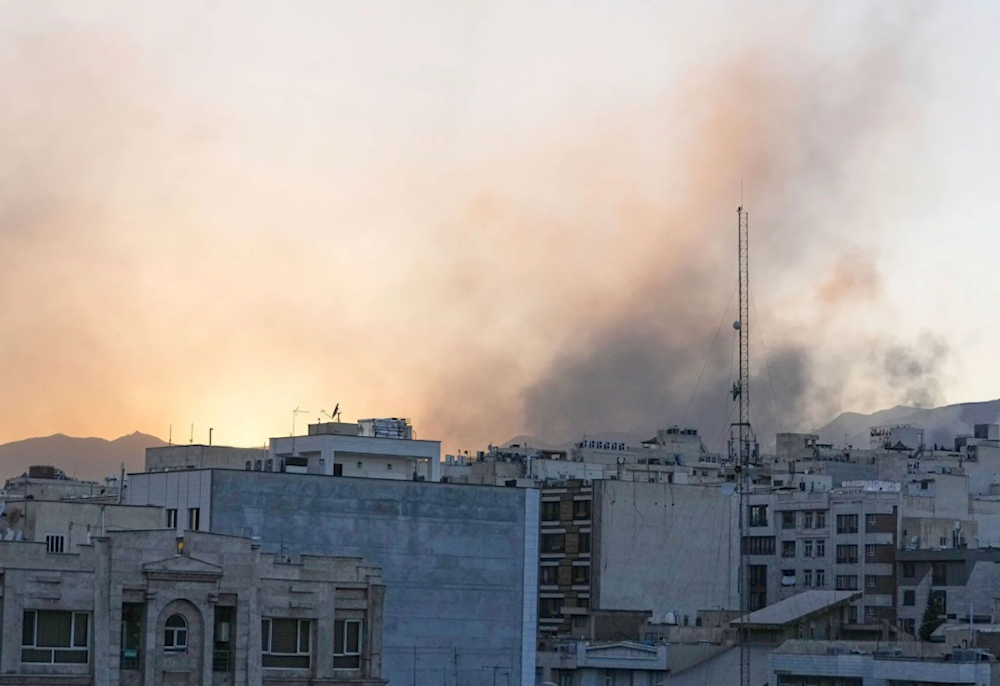No radiological impact detected in Iran's Karaj - IAEA Chief
IAEA Director General Rafael Grossi confirmed there is no evidence that Iran is pursuing nuclear weapons, despite recent Israeli attacks on Iranian nuclear facilities and renewed political pressure.
-

Smoke rises after an Israeli attack in Tehran, Iran on June 18, 2025. (AP)
No radiological impact was detected following the destruction of two buildings at a centrifuge component manufacturing site in the Iranian city of Karaj, International Atomic Energy Agency (IAEA) Director General Rafael Grossi confirmed on Friday.
"At the Karaj workshop, two buildings, where different centrifuge components were manufactured, were destroyed. There was no radiological impact, internally or externally," Grossi stated during a video briefing to the United Nations Security Council.
The confirmation comes in the wake of "Israel's" aggression on Iran. Iran has consistently denied having a military dimension to its nuclear program. Speaking on June 18, IAEA Chief Grossi said the agency had not found concrete evidence that Iran is currently pursuing nuclear weapons. U.S. intelligence assessments have reached similar conclusions, according to a CNN report citing sources familiar with the matter.
Craig Murray, a former UK ambassador to Uzbekistan and human rights advocate, told RIA Novosti that Iran has shown “extraordinary responsibility and patience” in recent years, despite repeated provocations from "Israel."
IAEA chief rebuffs Trump, says no evidence Iran has nuclear weapons
In a critical admission that undermines claims by the Israeli occupation and US officials, International Atomic Energy Agency (IAEA) Director General Rafael Grossi confirmed that there is no evidence Iran is pursuing a nuclear weapons program.
Speaking to CNN’s Christiane Amanpour on Tuesday, Grossi reiterated what Iran has long maintained, that the country is not systematically seeking nuclear weapons. "What we reported was that we did not have any proof of a systematic effort [by Iran] to move toward a nuclear weapon," Grossi stated, aligning his remarks with past IAEA assessments and independent sources.
His comments come at a time of renewed scrutiny following the IAEA Board of Governors’ recent resolution against Iran, which accused Tehran of non-compliance with nuclear obligations, a claim Iranian officials have firmly rejected as politically motivated.
Iran dismisses IAEA censure, reaffirms NPT commitments
Iranian authorities maintain that the Joint Comprehensive Plan of Action's (JCPOA) obligations are no longer binding due to the failure of Western signatories, particularly European nations, to uphold their commitments. However, they stress that Iran continues to operate within the framework of the Nuclear Non-Proliferation Treaty (NPT) and the IAEA’s Safeguards Agreement.
Unlike Iran, the Israeli occupation has refused to sign the NPT, a longstanding point of contention in regional non-proliferation diplomacy. Additionally, Tehran cites a religious decree by the Iranian leader, Sayyed Ali Khamenei, prohibiting the development or possession of nuclear weapons.
Grossi’s comments were made just days after Trump repeated long-debunked claims about Iran's alleged nuclear weapons ambitions. His remarks coincided with ongoing Israeli military aggression against Iran, including an attack on the Natanz nuclear facility in Isfahan, which resulted in casualties among military officials, scientists, and civilians.

 3 Min Read
3 Min Read








